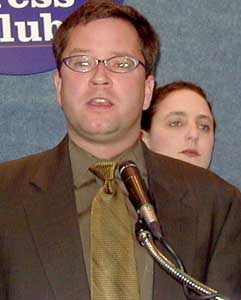-
- Repeal of “Don’t Ask, Don’t Tell” launched in House
- Three more years of debate will set the course for Anglicans and Episcopalians
- Panel rejects Arkansas bill to ban adoptions by cohabiting adults
- Topeka voters decide to keep law barring discrimination
- Baldacci links gay rights to economy
- Report: Hundreds of skilled military leave because of ‘Don’t Ask Don’t Tell’
- Police deem UNC student’s beating a hate crime
- Man pleads guilty for killing lesbian
- National News Briefs
- World News Briefs
national
Repeal of “Don’t Ask, Don’t Tell” launched in House
Vote not likely this legislative session but bill is good first step, SLDN says
Published Thursday, 10-Mar-2005 in issue 898
The first legislative attempt to repeal the anti-gay military policy known as “Don’t Ask, Don’t Tell” was introduced in the U.S. House of Representatives on March 2.
The Military Readiness Enhancement Act, HR 1059, is sponsored by Rep. Marty Meehan, D-Mass., the ranking Democrat on the House Armed Services Subcommittee on Terrorism, Conventional Threats and Capabilities. He is joined by 61 cosponsors. The lone Republican is Christopher Shays, R-Conn., though others have said they will join as cosponsors.
“The strain on our military personnel is one of the key national security challenges facing this country today. In a time of war, it is outrageous that our military continues to discharge thousands of experienced and dedicated service members – many with critical skills in the war on terror – for reasons that have nothing to with their conduct in uniform or their willingness to serve their country,” Meehan said.
The repeal is being supported by eight senior retired military officers in an effort organized by the Servicemembers Legal Defense Network (SLDN).
At Meehan’s request, the General Accounting Office (GAO) conducted an analysis of the cost of the 10-year-old policy. Their report, released on Feb. 25, estimated that it had cost the Pentagon more than $200 million to recruit and train personnel to replace those kicked out under “Don’t Ask, Don’t Tell”.
Money is but one of the issues. Many of those who have been discharged have language and other skills that are in short supply in the military.
And now bodies are in short supply too. In testimony before the Senate on March 2, the Army said that during the previous month only 5,114 recruits entered boot camp, 27 percent below its goal. The ongoing war in Iraq and likely deployment there is hindering recruitment.
“It is much more difficult to talk about repeal in the abstract,” said C. Dixon Osburn, executive director of SLDN. This bill gives them the opportunity to raise the issue with members of Congress. He says the Army’s recruitment shortfall and its desire to increase manpower by 30,000 makes it “a good time to talk about this.”
Osburn acknowledged that hearings on this measure, or a companion bill that will be introduced in the Senate, are not assured and a vote is not likely during this session of Congress. But it is a way to begin the education process.
He said he has been pleased by the guarded openness to consider a change in policy by unnamed Pentagon officials and the so far muted response from the anti-gay right. Several retired senior military officers support repeal of the ban.
“The dynamics today are very different from 10 years ago,” Osburn said, when “Don’t Ask, Don’t Tell” was adopted.
Eric Stern, executive director of National Stonewall Democrats, said, “A policy that dismisses qualified personnel based on personal prejudice threatens the security of our nation. This legislation will enable our armed forces to better protect the American homeland.”
“The report of the GAO … makes it clear that ‘Don’t Ask, Don’t Tell’ harms military readiness,” said Patrick Guerriero, executive director of Log Cabin Republicans. He looks forward to working with others and with “leaders in Congress to ensure that our military has policies that best reflect the needs of America’s national security.”
“Americans don’t care whether the person who catches Bin Laden is gay or straight, they just want him caught,” said David Smith, vice president of the Human Rights Campaign.
|
|
Copyright © 2003-2025 Uptown Publications


